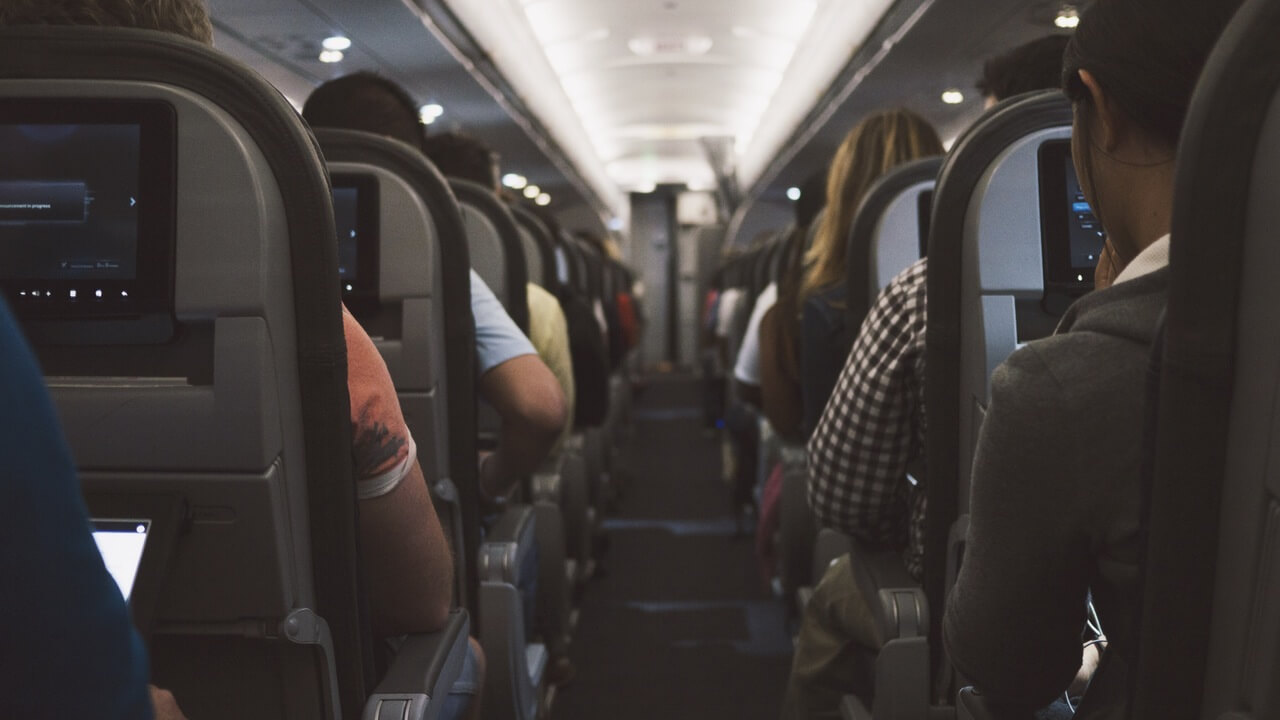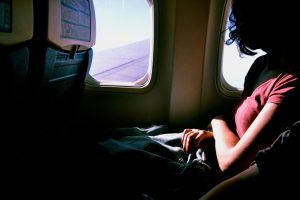Using Your Secret Super-Power to Conquer the Fear of Flying
It’s Not Just A Flight
I’ll never forget the desperation in her voice:
“If I can’t get on an airplane, I’m going to have to turn down yet another promotion.”

A lot of people have come to my office to conquer the fear of flying, and each one has its own unique motivation. A middle-aged woman longed to see the relatives she left behind in Scotland three decades ago. A retired gentleman wanted to take his wife on her dream vacation—on another continent. A young lady was thrilled to be the maid of honor at her best friend’s wedding but terrified to fly across the country to do it. Let me tell you, it’s incredibly gratifying when I get the call or email telling me that they flew comfortably, with no tension, stress, or fear. Some actually found it pleasant, or in the worst case, boring…
Not What You’ve Seen on TV
How is this accomplished? I’m going to tell you, and my words may conjure images that are almost 100% inaccurate—but that’s all right because then I’ll give you a more accurate picture of how these people (and many others) have tapped into their own secret super-power to enjoy flying.
So how is it done? One word: Hypnosis
The fact is that hypnosis is not what you’ve seen on TV. (So few things are when you get to the truth.) My clients don’t become zombies, float around the room, quack like ducks, or remember alien abductions. Some remain alert for the entire process, and some find they drift in and out of awareness, remembering it more like a dream they’ve just awakened from or a movie they’ve just seen. In many ways, a hypnotic experience is like a guided daydream that reprograms your subconscious mind. It is not about giving up control, but gaining more control over your own mind.
There are many definitions of hypnosis, but my favorite is that hypnosis is the art of getting real results from imaginary or suggested events. Consider this: If you have a fear of flying, the mere thought of getting on a plane may cause you to feel physically ill or extremely uncomfortable; your heart may pound, your thoughts may race to images of catastrophic outcomes, or your breath may become shallow—even though you are merely imagining a hypothetical plane-ride. Your body’s physical defense systems have kicked in, producing the same fight-or-run mode that kept our ancestors from being eaten by cave-bears—even though you are threatened only in your imagination.
Congratulations—you are already using hypnosis. You just aren’t using it to your advantage. It’s like a super-power you didn’t know you had, because you’ve been using it to limit yourself instead of to free yourself.
What Happens in a Hypnosis Session?
Every client who comes to me is different, so I customize the work to each person. Some start getting scared the minute they book the flight, and the fear builds until they are on the plane. Some feel fine until they look down the aisle to find their seat. Some are bothered only by turbulence or landings.
Likewise, some are not so much afraid of flying as of tight spaces, or being in a place where they have no escape route. One war veteran I worked with, in addition to being afraid to fly, was unable to ride in a car he wasn’t driving, get in an elevator, or even sit in the middle of a row at the movie theater. It’s important for me to get a snapshot of the fear.
The next question I ask is whether this started with an unpleasant flying experience. Now, I’m the kind of hypnotist who is much more concerned with my client’s future than the past, but I find if there was one identifiable event that set off the fear, my first step is to neutralize the memory of that event. While it would be possible with some clients to induce temporary amnesia for the event, lasting results usually involve clearing out the emotional impact rather than factual memory.
However, most of my clients do not have a single event to point to, so in most cases, we move right into the next phase, which involves a two-pronged approach.
First, I teach my clients several ways to hack into their autonomic nervous system to de-activate the fight-run-freeze response and instead activate the rest-relax-digest response. These skills are useful in any stressful situation, including traveling; they serve as a safety net for the client.
Second, I guide my client in a hypnotic experience that allows us to re-program the mind’s response to flight, so that the body no longer responds to flight as it would to a physical attack. There are several ways to do this, but perhaps my favorite is to “cut-and-paste” feelings of comfort from another experience onto the stimulus of flying so that the thought of getting on an airplane produces comfortable or neutral feelings rather than fear.
Usually this process takes from one to three sessions. I typically provide a relaxing recording of the session, which serves two purposes: It can be used between office visits to reinforce and strengthen the new responses, and it can be used during flight to produce comfort and relaxation. (I’m not afraid to fly, but I often use hypnosis recordings to pass the time on long flights. Did I mention that hypnosis feels wonderful?)
How Do You Find a Good Hypnotist?
Many articles will tell you to look for a licensed therapist to be your hypnotist. This is because licensed therapists either wrote those articles or consulted on them. But the truth is that, while some licensed therapists are also skilled hypnotists, the majority have no training and very little knowledge of hypnosis, having experienced only cursory (and often inaccurate) coverage as part of an introductory psych course.
So, instead, look at the hypnotist’s reviews and testimonials. Have other people overcome the fear of flying with that hypnotist’s help? Do past clients have a generally positive view of the hypnotist?
It’s important that you find a hypnotist who is a good fit for you. Look at the hypnotist’s website. Watch some of the hypnotist’s online videos. If you don’t feel comfortable spending a few hours with someone, they won’t be the right hypnotist for you.
Also, don’t feel that you have to be limited to your geographic location. Many hypnotists do sessions by Skype or phone.
Another option is a pre-recorded hypnosis session, which can be purchased on CD or download. While recorded hypnosis can be very effective and is certainly less expensive, it is generic. No recording will be customized to exactly your situation nor will it take advantage of exactly your strengths and resources the way that a live hypnotist can.
Freedom Awaits
Living in fear is no fun, and being unable to fly severely limits your ability to participate in modern life. Whether you use hypnosis or another method, commit yourself to conquering your fear.
About the Author
James Hazlerig, MA, is a hypnotist, author, meditation teacher, professional musician, laughter yoga instructor, and champion storyteller. In his Austin practice, he helps clients quit smoking, manage stress, and overcome fear. He has taught classes in many venues, including hypnotic storytelling and metaphor at Anne King’s Hypnosis Center. In 2014, he co-authored Speak Ericksonian: Mastering the Hypnotic Methods of Milton Erickson. In 2016, he published The Little Book of Laughnosis: Using the Hypnotic Power of Unconditional Laughter to Change Lives.
For more information, feel free to contact me or check out my website.




This blog is really interesting. Thanks you very much for the info.